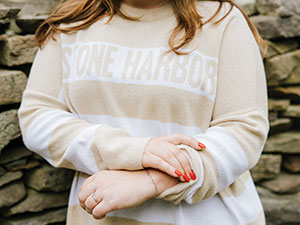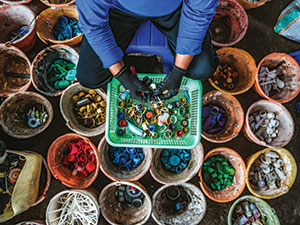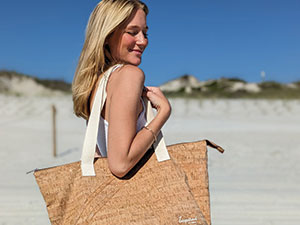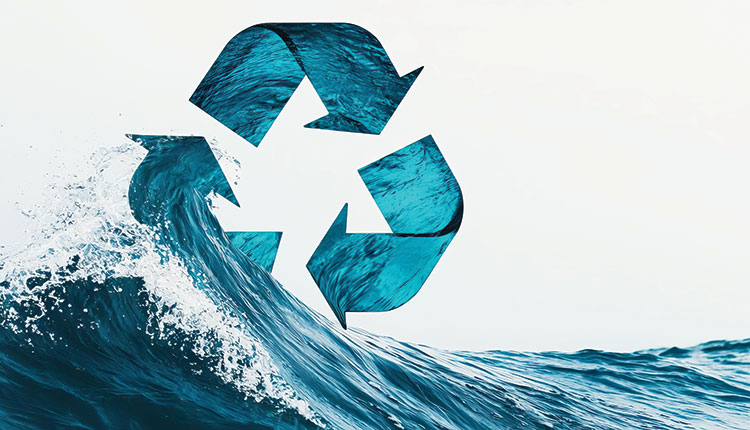Many trends come and go in souvenirs, gifts, apparel, decor and accessories, but one that isn’t going away and in fact continues to grow is sustainability.
“Seaside communities often have a strong connection to the environment. By offering eco-friendly products, retailers can cater to this environmentally conscious customer base and demonstrate their commitment to sustainability,” notes Kork co-founder Katrina Gates, who founded the company during COVID with best friend Kelly Winch.
Kork’s entire product range is crafted from cork, a sustainable material sourced from Portugal. It is a natural, biodegradable and recyclable material. Cork is harvested by hand every nine to 12 years, allowing the cork oak tree to regenerate its bark.
“We’re seeing a growing demand for products that are not only aesthetically pleasing but also align with consumers’ values,” says Winch. “Customers are increasingly seeking transparency about materials and production processes and are drawn to brands that prioritize sustainability and ethical sourcing.”
Here are some other products and trends that can serve as inspiration as you start exploring the world of eco-conscious products.
Part of the movement
4Ocean’s portfolio of eco-friendly products has expanded over the years beyond its bestselling bracelets to reusable water bottles, backpacks, jewelry, apparel, beach gear, home essentials, and even skateboards made from recycled nylon.
“Our goal is to make it easy for people to shop for their favorite items while helping protect our vulnerable waters,” says Jonathan Marshall, a 4Ocean spokesperson.

Town Pride’s bestselling knit sweaters are made in the U.S. using recycled yarn.
Every product 4Ocean manufactures is made from ocean-recovered materials the company’s captains and crews have cleaned from waterways around the world.
“Our dedicated cleanup crews pull all sorts of materials from marine ecosystems, including plastic, glass, metals, discarded fishing nets, and so much more,” says Marshall. “We process these into bracelets and other items that we sell online, working with local artisans in Bali, Indonesia, to create our popular designs.”
He observes that consumers are looking for more storytelling from the brands that they purchase. “We’re seeing more people follow a brand’s story well before making a purchase, as they evaluate whether they support their mission and vision. As marketing and social media trends coalesce, a larger proportion of sales are driven by the desire to be part of a movement.”
The Ocean Collection from Vent for Change includes notebooks and pens made from recycled ocean waste plastics.
Available in four seaside colors, the Ocean Collection is a big seller for seaside retailers. “People living by or visiting the seaside and coastal areas are more and more aware, and an eco-product, particularly one helping protect the oceans, is a fabulous way of demonstrating you care,” Evan Lewis, founder and CEO, says.
Not going to waste
Town Pride’s eco-friendly product options include tote bags, notepads, knits, wood signs and new hemp yarn goods.
“Our products offer such features as recycled cotton, paper and wood as well as limited packaging and a smaller carbon footprint manufacturing in the United States,” notes Tamara Moran, president of Town Pride.
“Our bestselling products are our knit sweaters; they feature recycled yarn and an eco-friendly process that is water- and chemical- free and limits waste.”
Moran is seeing trends in new materials that are recycled or upcycled, sustainable packaging and energy efficient production methods as well as some interesting uses of plant-based dyes as the desire for sustainable products accelerates.
“Conscious consumerism is growing,” says Moran. “We embrace slow fashion and continuously work to identify sustainable fashion solutions like our new hemp yarn.”
Shades that shine
In January, Hobie Eyewear introduced its Hull Float sunglasses, designed for eco-conscious anglers and water adventurers.
The floatable Hull Float sunglasses are crafted with frames made from 100% upcycled scrap plastic, a byproduct of the Hobie Kayak production process. In addition, the biobased polarized lenses incorporate castor oil-derived materials.

Recovered ocean debris is sorted by color to become 4Ocean bracelets.
“The Hull Float style embodies Hobie’s unwavering commitment to innovation and sustainability, showcasing our determination to reduce our carbon footprint,” says Stephen Vaughan, Hobie Eyewear senior director for product development. “With Hull Float, we’ve pushed beyond conventional materials and techniques to create a truly sustainable sunglass.”
Nourishing the planet
AmuseMints, the souvenir division of Nassau Candy, is seeing popularity with its eco-friendly Sea Snacks, which include chocolate-covered red fish, mini sour sharks, fruit sours and sea salt caramels.
Each come in compostable peg bags, tubs made with post-consumer recycled plastic, and post-consumer recycled boxes. Paper packaging and acetate tubs for Sea Snacks are sustainable as well.
“The peg bags, tubs and boxes feature vibrant colors with an aquatic theme making them primed for gifting, particularly for seaside destinations,” notes Lance Stier, head of AmuseMints’ parent company, NC Custom.
A holistic approach
Sustainability is at the core of everything Nature Planet designs, sources and produces, according to Lisa Jones, U.S. sales director. “That’s why we offer a wide range of eco-friendly products, including plush, toys and accessories, all crafted with the planet in mind.”
Its Eco Pals plush line is made from 100% recycled plastic bottles, and its selection of accessories are made from 100% organic cotton.
Nature Planet also uses uncoated hangtags attached with natural cords instead of plastic taggers, and display signs are made with eco-friendly materials. “We eliminate plastic from all packaging during transportation, further reducing our environmental impact,” adds Jones.
Parental priorities
The Petting Zoo offers two signature eco-friendly lines. Wild Onez, its flagship collection, known for realistic wildlife and aquatic creatures, are crafted with eco-friendly materials like recycled water bottle filling, soy-based inks and recycled paper tags.
The Earth Keeperz line takes sustainability even further, according to Tawni Buhler, vice president of marketing, “with fabrics made of recycled water bottles and custom- embroidered eyes.”
First & Main’s new Marine Wonders line of plush includes humpback whales, rays, sharks, iguanas and gators. Both the outer and inner material is made from fibers that include recycled water bottles.
The company trademarked the Shark Skin Suede material used on its plush sharks described as “an innovative blend of new and recycled materials, providing a softness unparalleled in the market,” according to Brad Holes, owner.
The whole package
Wild Republic also offers several eco-friendly products made entirely from recycled materials, from biodegradable plush to toys made with wheat materials.

Kork bags are not only designed for their aesthetic, but also to align with the eco-conscious values of consumers.
Bestsellers include sea turtles and axolotls made from 100% recycled fabrics, fillings and threads; come in plastic-free packaging; and are stuffed with recycled materials.
Doug Snider, global impressions director for Wild Republic, observes, “Demand is growing for eco-friendly products that educate children about sustainability while aligning with broader environmental values.”
Connor Atkins, marketing representative at The RGU Group, says the company’s goal is to convert as many of its items as possible to be sustainable by the end of 2026.
Its Totally United line is made from recycled materials and T-shirts on RGU’s 9-inch plushies use recycled fabric. RGU’s graffiti-inspired teddies are also made from 100% recycled plastic. “Since their inception in 2024, we’ve kept over 2 million half-liter bottles out of the landfill or environment, and we’re just getting started,” Atkins says.
Answering the call
Call For The Wild’s products educate people about the vulnerability of wildlife while also using materials that help protect it and supporting organizations whose missions align with wildlife conservation. “At Call For The Wild all our products are designed with eco-friendly, sustainable materials, packaging and processes in mind,” says Billy Campisciano, executive director.
For example, a glow-in-the-dark egg used in its turtle and aligator hatchling toys is made with bioplastic that uses plant-based resins. “The eggs are compostable with water, heat, and bacteria found in a landfill, eliminating microplastic. All our shipping tags, materials and packaging are cellulose based or biodegradable,” says Campisciano.
By carrying eco-friendly products seaside retailers are indirectly caring for the environment that supports their livelihood, notes Atkins.







